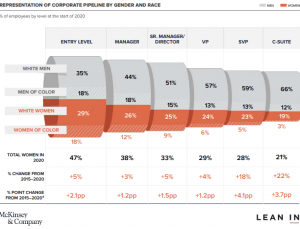McKinsey Study Calls Covid-19 a ‘Clear and Present Danger’ to Workplace Diversity

“Women in the Workplace” is a joint study conducted by McKinsey & Co and LeanIn.org. Begun in 2015, its authors call it the most comprehensive study of the state of women in corporate America. In the four years since 2015, almost 600 companies and over 250,000 people were surveyed on their workplace experiences. The most recent report has just been published, revealing the impact of COVID-19 on efforts to promote diversity in the workplace. The results are a clarion call to management to do a better job of helping employees manage this work-life balance catastrophe that has had a disparate impact on women, especially Black and Latina mothers, or risk losing substantial ground in those diversity efforts. It is an industry-wide challenge, and as a society, we need to do a better job of supporting the mothers that are doing their best to juggle careers and parenting in these very challenging times. It is settled science that having a diverse workforce pays off.
One of the findings of the study will come as no surprise to most people: 76% of mothers with children under age 10 say childcare is one of their top three challenges during Covid-19, compared to 54% of fathers with young children. While more than 70% of the men who responded to the study report that they split household labor equally with their partner during Covid-19, only 44% of mothers say the same.
“Decades of research show that women do significantly more housework than men – so much so that women who are employed full-time are often said to be working a ‘double shift’. During Covid-19, women – and mothers in particular – are taking on an even heavier load.”

Because of the nearly impossible job of managing their children’s online school experience, caring for family members who get sick, and maintaining productivity levels from before the crisis, many women managers are considering chucking it all.
The concern is the long term damage to what the report calls ‘the pipeline,’ which is critical to the progress that’s been made over the past five years. Losing senior level women at this point will cripple a company’s efforts to ensure a diverse workforce. The ‘broken rung’ – the disparity in promotion of women into senior management positions – is still a problem. For every 100 men promoted to management, 85 women ascend that ladder. And the study shows that women in senior management positions are more that 3x more likely to consider dropping out because of Covid-19 than their male peers. The pressures are just too great.
“The broken rung has a long-term impact on the talent pipeline. Since men significantly outnumber women at the manager level, there are far fewer women to hire or promote to senior managers. And the number of women decreases at every subsequent level. So even as hiring and promotion rates improve for women at senior levels, women as a whole can never catch up. There are simply too few women to advance.”
How companies are supporting employees
While companies may be communicating well with employees about the pandemic, fewer are actually stepping up to provide resources to address the burn-out and stress their employees are feeling. While they may be providing information about their own paid leave policies, for example, they aren’t for the most part trying to provide homeschooling or parenting resources. While companies may be specifically telling employees what their expectations are for productivity and performance reviews, fewer are changing their policies in response to the emergency. While they have communicated to employees their commitment to their well-being and mental health, fewer have actually provided mental health services, provided health checks, or bereavement counseling. While some companies are communicating about their own financial health or announcing whether there will be layoffs, fewer are providing emergency loans, stipends to offset the costs of working from home, or job training and re-skilling for those that need to change careers.
“I feel like I am failing at everything. I’m failing at work. I’m failing at my duties as a mom. I’m failing in every single way, because I think what we’re being asked to do is nearly impossible. How can you continue to perform at the same level as in the office when you had no distractions, plus being asked to basically become a teacher for kids and everything else with online learning? I’m doing it all, but at the same time I’m feeling like I’m not doing any of it very well. I also worry that my performance is being judged because I’m caring for my children. If I step away from my virtual desk and I miss a call, are they going to wonder where I am? I feel that I need to always be on and ready to respond instantly to whatever comes in. And if that’s not happening, then that’s going to reflect poorly on my performance.” White woman VP with two children age 7 and 11.
Latina and Black mothers are shouldering heavier burdens than white mothers, says the study. They are more likely to be their family’s sole breadwinner or to have partners working outside the home during Covid-19. They are doing more at home, too: Latina mothers are 1.6 times more likely than white mothers to be responsible for all childcare and housework, and Black mothers are twice as likely to be handling all of this for their families.
“I have weeks when I feel burned out. Before the pandemic, my parents helped with childcare, but now everything falls on me. I feel overwhelmed at least two or three days a week. It’s really hard to put toddlers and babies on a schedule and have them entertain themselves. The biggest challenge is meetings. I need to be available for meetings at core business hours, and it’s very hard to focus when my kids are in the room.” Latina manager, two children under age 4.
The report outlines six areas where companies should focus or expand their efforts:
- Make work more sustainable. Rethink productivity and performance expectations until the crisis has abated. Find creative ways to give employees time for their families.
- Reset norms around flexibility. Many employees feel like they are ‘always on’. Encourage workers to set their own boundaries and remove the stigma attached to using them.
- Take a close look at performance reviews. Criteria set before Covid-19 may not be appropriate.
- Take steps to minimize gender bias. Leaders should publicly speak to the potentially outsized impact of bias during Covid-19. Track outcomes in promoting — and layoffs — to make sure women and men are being treated fairly.
- Adjust policies and programs to better support employees. Organizations need to reallocate resources to reflect the new normal
- Strengthen employee communications. Share updates on the state of the business and key decisions that affect workers. Communicate with empathy so employees feel valued and understood.
Companies are trying to step up. But to retain the women most impacted by the challenges of Covid-19, there is a clear and present danger that they aren’t doing enough.












